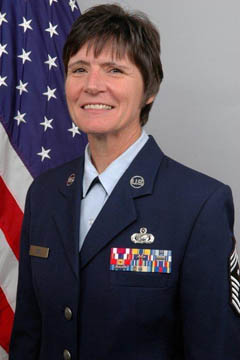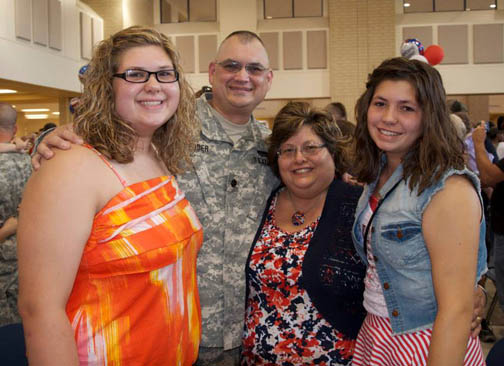Purdue Today honors veterans with profiles
November 11, 2013
 |
|
Sandra Dye, operations manager for the Office of the Vice President for Research. Official military photo from 2010. (Photo provided) |
As part of the University's observance of Veterans Day, Purdue Today is profiling three Purdue employees who have also served in the military -- Sandra Dye, an operations manager for the Office of the Vice President for Research; Gary Steinhardt, professor of agronomy; and Kevin Vedder, director of organizational change management.
With 446 employees and 369 students who are veterans, Purdue offers several programs and initiatives offering support for veterans and their families including the Veterans Success Center, Veterans Mentor Program, Entrepreneurship Bootcamp for Veterans with Disabilities, Purdue Student Veteran Organization, Military Family Research Institute and Operation: Military Kids.
Positive support
From care packages to flexible work schedules to kind words from strangers and friends, Sandra Dye says the Purdue community has been very supportive during her time in the military. She is chief master sergeant, the highest enlisted rank in the Air Force, and works in aircraft maintenance squadron at Grissom Air Reserve Base.
"I have received such positive support," Dye says. "Something as simple as someone thanking me for my service shows that people care, and that means a lot."
Dye has extensive experience with the Air Force Reserve, including multiple deployments to the Middle East and Europe and serving as the assistant director for the Yellow Ribbon Reintegration Program, which supports military members, families and communities during the entire deployment cycle. Dye now works with programs at Purdue and local veterans organizations that have the same goal of helping service members and families during deployment.
"I understand the good and the bad that military members and their families go through," Dye says. "At one time or another, either I've experienced something similar or have helped another military member or family through the tough times. There are many resources available to military members and their families, and I want to help them find the right resources at the time that they need them.
"Operation: Military Kids at Purdue has been great at helping military kids through difficult times and the Student Veterans Organization is also great, along with the Veterans Success Center on campus. We are fortunate that so many people at Purdue care, and we appreciate it very much."
Returning home
 |
|
Gary Steinhardt pictured in Class A uniform in July 1969. Steinhardt is a professor of agronomy. (Photo provided) |
Gary Steinhardt knows what it feels like to receive a cold welcome home when returning from military service. After serving for a year in Vietnam, Steinhardt says, he felt the sting of rejection when he returned to America.
"People were cruel, they really were," he says. "I will never forget that feeling."
Despite the cold reception, Steinhardt says he is proud of his service in Vietnam, which included working with a civil affairs unit and as a part of a rural advisory team. Steinhardt also later served in Cambodia, where he worked with interpreters to explain to the Cambodians the role of Americans in their country, and he commanded an Army Reserve unit mobilized in 1991 for Operation Desert Storm. Steinhardt retired from the Army Reserve as a colonel after 30 years.
Steinhardt now uses the lessons he learned from his military experiences to help young veterans adjust to civilian life. He mentors young veterans and also works with local veterans groups including the Tippecanoe County Veterans Council.
"I want to be supportive of them because I have been in their shoes and I know the kinds of feelings they have when returning from service and the kinds of challenges they face," Steinhardt says. "We want to reassure student veterans that we are ready to listen and help them readjust to civilian life.
"I am always impressed with young veterans who want to get an education and improve their lives. Education in the hands of veterans can make them so much more productive."
A careful balance
Kevin Vedder understands the challenges military members face while trying to balance their careers, families and military service. Vedder is a lieutenant colonel in the Indiana Army National Guard.
 |
|
Kevin Vedder, lieutenant colonel in the Indiana Army National Guard, reunites with his wife, Holly (center), and daughters Shelby (left) and Riley when he returned in late June from a yearlong deployment in Kuwait. (Photo provided) |
During his 28 years in the military, Vedder has served in a variety of roles and locations -- providing security support during the 1996 Summer Olympics in Atlanta, serving as part of a peacekeeping operation in Bosnia, combat operations in Iraq. This June, he returned from a yearlong deployment in Kuwait.
"It is definitely a challenge to balance a military career with life here at home," Vedder says. "Having family support is something I believe is essential for long-term service in the military. They understand I may not always be able to attend various functions like weddings, birthdays or school events. They support me by never complaining, making me feel guilty or being upset as they share in my commitment to serve and recognize the importance of this service, for which I am forever grateful.
"With regard to my co-workers and Purdue career, I am fortunate to work with people that understand the importance of what I was doing and always offered support, assistance and encouragement to me. They never made me feel guilty for having to handle things for me when I was performing military service, even if on short notice, and always told me things would be handled on the work front and for me to focus on whatever military task was at hand."
Vedder is among the many Purdue employees with military service who are now working to create programs and initiatives to help current students and staff members balance their education or civilian career workload with their military commitments.
"I think Purdue goes above and beyond what other places might do, both at the institutional and individual department levels," Vedder says. "We have meaningful programs that provide services like mentorships to help military members deal with the challenges that come with deployment and other issues."
When Vedder retires from the Indiana National Guard in December, he plans to become even more involved in such programs, including the Veterans Mentoring Program.
"I am definitely interested in these kinds of mentor programs because I think they really help members of our Purdue community," he says. "After my retirement, I plan to also become more involved with veterans and groups in the area that help veterans overcome the challenges they face."
Writer: Chris Adam, 49-62296, cadam@purdue.edu

